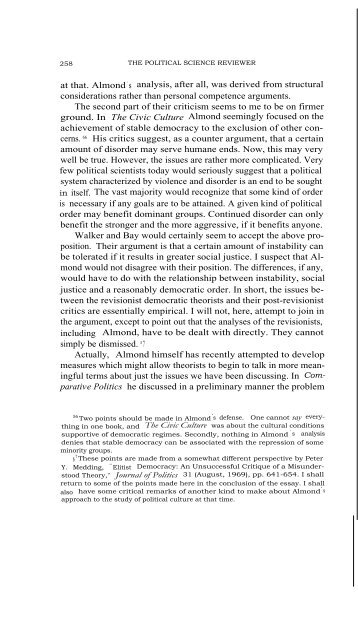FUNCTIONALISM AND ITS CRITICS - Intercollegiate Studies Institute
FUNCTIONALISM AND ITS CRITICS - Intercollegiate Studies Institute
FUNCTIONALISM AND ITS CRITICS - Intercollegiate Studies Institute
Create successful ePaper yourself
Turn your PDF publications into a flip-book with our unique Google optimized e-Paper software.
258<br />
THE POLITICAL SCIENCE REVIEWER<br />
at that. Almond ' s analysis, after all, was derived from structural<br />
considerations rather than personal competence arguments.<br />
The second part of their criticism seems to me to be on firmer<br />
ground. In The Civic Culture Almond seemingly focused on the<br />
achievement of stable democracy to the exclusion of other concerns.<br />
66 His critics suggest, as a counter argument, that a certain<br />
amount of disorder may serve humane ends. Now, this may very<br />
well be true. However, the issues are rather more complicated. Very<br />
few political scientists today would seriously suggest that a political<br />
system characterized by violence and disorder is an end to be sought<br />
in itself. The vast majority would recognize that some kind of order<br />
is necessary if any goals are to be attained. A given kind of political<br />
order may benefit dominant groups. Continued disorder can only<br />
benefit the stronger and the more aggressive, if it benefits anyone.<br />
Walker and Bay would certainly seem to accept the above proposition.<br />
Their argument is that a certain amount of instability can<br />
be tolerated if it results in greater social justice. I suspect that Almond<br />
would not disagree with their position. The differences, if any,<br />
would have to do with the relationship between instability, social<br />
justice and a reasonably democratic order. In short, the issues between<br />
the revisionist democratic theorists and their post-revisionist<br />
critics are essentially empirical. I will not, here, attempt to join in<br />
the argument, except to point out that the analyses of the revisionists,<br />
including Almond, have to be dealt with directly. They cannot<br />
simply be dismissed. 5 7<br />
Actually, Almond himself has recently attempted to develop<br />
measures which might allow theorists to begin to talk in more meaningful<br />
terms about just the issues we have been discussing. In Comparative<br />
Politics he discussed in a preliminary manner the problem<br />
56 '<br />
Two points should be made in Almond s defense. One cannot say everything<br />
in one book, and The Civic Culture was about the cultural conditions<br />
supportive of democratic regimes. Secondly, nothing in Almond ' s analysis<br />
denies that stable democracy can be associated with the repression of some<br />
minority groups.<br />
6 7 These points are made from a somewhat different perspective by Peter<br />
Y. Medding,<br />
"<br />
Elitist Democracy: An Unsuccessful Critique of a Misunderstood<br />
Theory," Journal of Politics 31 (August, 1969), pp. 641-654. I shall<br />
return to some of the points made here in the conclusion of the essay. I shall<br />
also have some critical remarks of another kind to make about Almond ' s<br />
approach to the study of political culture at that time.
















